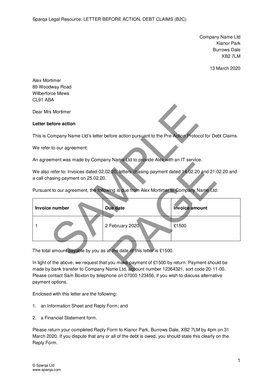 Small claims are simple, comparatively low-value legal claims brought in the County Court. They are relatively quick and straightforward, the idea being that you do not need a lawyer (although you may use one if you want to). In answer to the question of what a small claim in the UK is, we’ve set out some basics below.
Small claims are simple, comparatively low-value legal claims brought in the County Court. They are relatively quick and straightforward, the idea being that you do not need a lawyer (although you may use one if you want to). In answer to the question of what a small claim in the UK is, we’ve set out some basics below.
What constitutes a small claim
For a matter to be considered a small claim in the UK, the amount you are claiming must not be more than £10,000. This threshold is just for the basic amount that is in dispute, so if you were claiming £10,000 plus interest of £800, the claim could still be a small claim because the basic claim amount is within the £10,000 limit.
In addition to this claim threshold, a small claim in the UK must not be complex. For example, a claim that involves expert evidence will be complex, so won’t be treated as a small claim. If your claim simply relates to money you’re owed (for example, if your supplier has not sent your goods or a customer has not paid for a product or service you have provided), your case usually won’t be complex.
What happens if your claim is not a small claim
If you bring a claim to the court that does not satisfy the tests for a small claim (eg the amount of money that you are claiming is over £10,000 or the court considers it to be too complex), your case will be treated differently.
It will be labelled as either a fast-track or a multi-track case. These are both procedurally longer, more expensive and more complicated for you than small claims. Although technically you can still deal with these sorts of cases without the help of a lawyer if you wish, it is both risky and difficult to do so and should be avoided.
Before starting a small claim in the UK
Before starting a small claim, you must try to resolve matters with the other party first. This is because:
- The law requires you to consider alternatives and treat going to court as a last resort. If you don’t, the court can order you to pay some or all of the legal costs incurred by the other side, even if you ultimately win the case.
- Bringing a small claim isn’t necessarily desirable for you or your business. It is stressful, costs money, takes time, isn’t usually confidential, and you may not win your case.
For these reasons, you should always try to resolve your dispute out of court before suing someone.
The main ways you can try to resolve a potential small claim out of court are negotiation (by emails, letters, calls or face-to-face meetings with the other side to try and settle the dispute) and mediation. Use our small claims toolkit to guide you through the process of making a small claim in the UK. It includes letters to send to your debtor setting out what you are claiming and attempting to settle the debt before making a claim.
See Resolving disputes proactively for more detail on these methods in the context of resolving a dispute with your customer.
How much it costs to bring a small claim
If you bring a small claim, you will have to pay:
- a fee to start your claim (known as an issue fee); and
- a hearing fee.
You may also have to pay:
- additional court fees depending on how your case progresses; and
- legal costs, if you engage a lawyer.
Issue fee
You will always have to pay an initial court fee to bring a claim (known as an issue fee). The amount of the fee depends on the value of your claim (including interest), and ranges from £35 (for a claim less than £300) to £455 (for a claim of £5,001 to £10,000).
If the case is worth more than £10,000 it will not normally be considered a small claim. See Taking legal action for details of the fees payable in these circumstances.
Hearing fee
If you are the one bringing the claim, you have to pay a hearing fee when the court sets a trial date for your small claim. The cost of this fee also depends on the value of your claim (ranging from £27 for a claim up to £300, to £346 for a claim of more than £3,000).
Other court fees you might have to pay during a small claim
Aside from the mandatory fee to start the claim and to get a trial, there may be other fees for you to pay depending on how your case progresses. For example, the cost of filing for an appeal if you wish to appeal a decision, or the cost of having a court enforce its decision if the defendant is ordered to pay you money and does not do so.
How long it takes for a small claim to be heard
This depends on whether your claim is defended or not. If the defendant does not dispute the claim, it can be decided within as little as six weeks.
On the other hand, if the defendant does dispute the claim and a hearing is required, it will generally take longer as the court will have to give you a trial date. Your claim will usually be concluded within a year (but may take longer in some circumstances).
The content in this article is up to date at the date of publishing. The information provided is intended only for information purposes, and is not for the purpose of providing legal advice. Sparqa Legal’s Terms of Use apply.

Marion joined Sparqa Legal as a Senior Legal Editor in 2018. She previously worked as a corporate/commercial lawyer for five years at one of New Zealand’s leading law firms, Kensington Swan (now Dentons Kensington Swan), and as an in-house legal consultant for a UK tech company. Marion regularly writes for Sparqa’s blog, contributing across its commercial, IP and health and safety law content.






